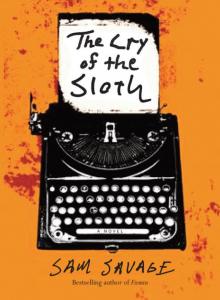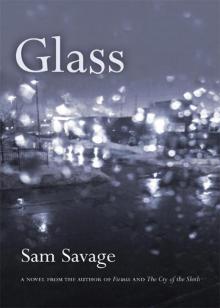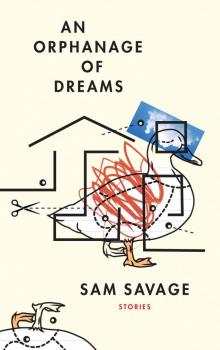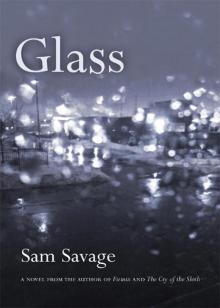- Home
- Sam Savage
Glass Page 6
Glass Read online
Page 6
Sleepless nights filled with wild thoughts, distracted days, typing fitfully, with many long blank spaces. Sometimes I type and think; more often I think without typing, in the armchair or in bed or sitting on a bench in the park. I was not able to fall asleep last night. I lay in bed for hours, staring up at the dark where the ceiling was, eyes locked open, and I thought, This is how I will look when I am dead. I got out of bed, nearly fell out, sitting on the floor for a few minutes first before getting up and going into the living room. Dawn was hours away, and I could hear the rat moving about. When I switched on the light, it lifted its head and looked at me. I tried to imagine that it looked surprised at seeing me in the living room at that hour, but that was difficult: rats don’t seem to have much in the way of expressions, except, of course, agony and the like, which all animals can express—even insects can express that. I slid several pages across the floor with my foot, to a spot near the armchair. I sat in the chair and picked them up and read them over to see if they were up to snuff. Finishing a page, I dropped it next to the chair, the way I always used to in the evening, when I would read over the pages I had typed that day. In those days, after reading a page I would let my arm hang out over the side of the chair, dangle out over the floor, still absently clutching the page, while I read through the next, and then just before reaching the bottom of that one I would let the suspended sheet slip from my fingers and whisper slantwise to the floor, lackadaisically, in a gesture of casual disdain, I thought at the time, as opposed to Clarence’s frantic way of balling pages up and throwing them at the trash can or making neat self-congratulatory stacks. Sometimes he would yank a page out of the typewriter with such violence he would make the roller shriek and cause me to jump out of my skin. Clarence was always loudly balling up pages, it seems to me. We once had a debate about whether crumpling paper was a useful release of tension, which was his position, or ostentatious self-indulgence, as I maintained. In the end, when he could not think up any more good arguments, he balled up a page and threw it at me. “Up to snuff” was one of my father’s favorite expressions. When he let a servant go, it was because that person was not up to snuff, unless of course the servant had been caught stealing and then he would mention that instead; and not only servants—President Roosevelt (that would be Franklin D. Roosevelt) was not up to snuff, because Papa had not approved of his economic schemes. He said the schemes were a load of hooey. And one day Nurse was no longer up to snuff; I don’t know why. I was constantly fearful that I would turn out not to be up to snuff, and I am certain Mama was not up to snuff. On the opening day of shooting season when I was ten, it was discovered that she had gone off in the night with a man named Roger Pip, who had used to play golf with Papa. When Papa found the note, which Mama had attached to the collar of his favorite gun dog, he was on the front steps dressed in a brown tweed shooting jacket, which he ruined by tearing off a lapel. After that he must have been truly demoralized, and he took to drinking huge quantities of Scotch instead of brandy. Unfortunately he could not hold his liquor anymore, and after the third drink he would sometimes shout at me, and after the fifth he could not tell which way was up. Six months after Mama fled I was sent away to school, boarding first in a large house with two elderly women and then later in a dormitory with other girls my age. It is not plausible that I actually remember Papa finding the note and tearing his jacket, since when he went shooting he never set out directly from the house in town but always from a lodge somewhere, so in fact I don’t know how he found out that Mama was gone—perhaps he came to realize it only gradually, as I did after a while, after she had been gone a long time. The social whirl, as I saw it, had just swallowed her up. It swallowed her up, and after a few years it spit her out again, in San Diego, where she lived with a man named Hanford Wilt until she died. I was nineteen when she died. Every Christmas and every birthday she sent me presents, always jewelry of some sort, and with the presents came a letter, which she would sign “Mama” and in parentheses write “Margaret Wilt,” in case I had forgotten who “Mama” was. The letters were typed on blue paper. There was a girl from California at school who told me San Diego had a perfect climate, with only three rainy days a year. It struck me as odd that a person named Margaret Wilt would choose to live in a place with so little rain. Mama was not a good typist, her letters were full of x-ed out words, sometimes whole lines of x’s. Not a good mother either, I imagine you are thinking.
The tank is still there, on the floor next to the fern, where Potts and I set it down. If I lean back in my chair, I can peer around the fronds and see the rat moving restlessly about down there. It scurries this way and that, climbs up on its little metal wheel and climbs down again, digs in the shavings with its forepaws like a dog, sniffing. Now and then it pauses and peers out through the glass wall of its enclosure. Its pink nose twitches. Its actions have a purposeful air, but at the same time they seem completely pointless. Not utterly different from mine, I suppose, if someone were to watch me going here and there in this apartment; a question of scale. “Edna scurries pointlessly this way and that in her enclosure,” the person watching me might write. Brodt, when he used to watch me roaming about, might have written something of that sort. At some point, after Mama left, they told Papa I was suffering from nervous agitation. I don’t know who told him, somebody did, and he took me out of the country, going first to England, to London, where we saw a very short, very pale doctor with bad teeth who was not English in the least (he was Russian, possibly; I have an impression of a Russian-sounding name, and I catch myself thinking it must have been “Chekhov,” because, I suppose, Chekhov was a Russian doctor also) and then on to Belgium, where we spent the summer in the countryside south of Namur, in a hotel made from an eighteenth-century palace. “We” at that point did not include Papa, who had left us on the dock in Dover to go look after his business, I think now, or to go look for Mama, as I imagined at the time. The woman who succeeded the woman who had followed Rasputin traveled with us on the boat going over and stayed with me when Papa left. I called her Nurse also, though she was not at all like the original, being American, diminutive, blonde, and not wearing an apron always, and she was more fun and less enveloping than the first Nurse, less comforting in an enveloping sense, as everyone from then on really had to be. She taught me how to play four kinds of solitaire, not including double, which is not solitaire at all and which we played endlessly in the hotel dining room while waiting for lunch. In the flagstone courtyard was a stone dolphin that spit water from its mouth, and they served fish every Friday. I don’t eat fish. The hotel was always crowded, thoroughly stuffed with a great many strange people, including a man who walked holding his shoes in his hands, even in the garden, a boy my own age who barked like a dog when spoken to, and a wispy middle-aged woman who on occasion went into the woods and sang “mon coeur est un violon.”
I fell asleep on the sofa. I woke up and it was morning. I opened my eyes, then closed them. I dwelled within a while longer, rummaging there for the remnants of sleep. They eluded me. An awareness of things—hardness of sofa, stiffness of legs, emptiness of stomach—forced consciousness upon me, insidious, insistent, irresistible. One more time. Lying on my back, I stared wide-eyed at the ceiling and listened to the traffic building toward rush hour. Whenever I am home the noise of traffic is out there, more or less, sometimes drowned by the noise of the compressors, sometimes drowning the noise of the compressors, not always heard, seldom listened to except at moments like this, on waking, when the mind gropes for bearings, sometimes not telling for a glad moment if that sound is not truly the ocean. Only on Sundays and in the wee hours of the morning does the roar diminish to where I can pick out the voices of individual vehicles, separate the sad rumble of the old ones from the whistling smooth rush of the new ones or follow the heaviest trucks shifting down octaves on the curving ascent to the Connector. I have moved the fern. I got down almost on my knees, placed my hands on the rim of the pot, buried my face in the fronds (they s
melled like a forest after rain), and pushed. Though my feet slipped from under me several times, knees banging the floor, I managed to shove the pot across the room. But unable to see where I was going, I continued pushing until it crashed to a stop against the wall next the bookcase, pitching me forward into the foliage and snapping several fronds. The pot had pushed up the rug as it slid, folding it into large accordion pleats that were now wedged between the pot and the wall and that took all my strength and several hard jerks to pull out. I was leaning over the bookcase, elbows resting on it, catching my breath, when I noticed the dust on top. I had not noticed it before, not recently in any case, because I don’t ordinarily hang my head a few inches above the furniture, as I was doing then. My eyesight is fairly good, considering, but not so keen that I can discern from far off something as retiring and minute as dust. It was, I saw, leaning over it, a rather thick coating, a depressing example of how small things accumulate, so I really might have seen it from a distance had I bothered looking in that direction, looking intently, that is, with the goal of seeing, not just gazing aimlessly about as I am bound to do when navigating this way and that in the apartment so as not to crash into things. Desiccated insects caught between windows and storm panes are a second type of depressing small thing that I have noticed accumulating lately. The fact is, I have not been even mildly interested in the bookcase for quite some time now, ever since I stopped reading, and I doubt that I have glanced in its direction, seeingly in that direction, even once, except for the time weeks ago when I plunked the stack of new ribbons on top of it, when I was too excited, enchanted by the prospect of typing again at last—unexpectedly typing again at last—to notice anything at all. Now that I have noticed the dust I am going to fetch a cloth from the kitchen and wipe it off. Yellow and brown paint flakes accumulating at the foot of the wall on the landing and stairs would be a third. The bookcase is a quite ordinary piece of furniture, not large, made of plywood and veneer. In it I keep the books I expect to read someday along with the ones I have finished reading but have not bothered to put away. Some have been there a long time waiting for me to get around to them. And I keep a few photographs on top, in ornate pewter frames that we bought in Mexico. All the photographs that are not in frames I keep in the letter box, as I think I mentioned. Also on top, between two photographs, is a stack of small flat boxes; those are my typewriter ribbons. I like being able to look up from the armchair or the typewriter and see the stack of ribbons; it gives me confidence that I will be able to keep on typing. I was on the verge of writing, “keep on typing until I finish,” when it occurred to me that I am not exactly sure what finishing means or how I will know when it is finished; I don’t even know what it is. When I wrote those words I was just thinking in a vague way of getting to the end of whatever this is, even if in the end it is still not complete, “end” in that case meaning just the place where it stops. With the fern out of the way, I can look down at the rat’s tank on the floor while I am typing. I begin to type, and the renewed clatter of the keys seems to startle it, and it looks up at me. At other times it clings upside down to the lid of the tank and peers up at me through the wire while making an odd rattling noise with its teeth. Potts says in her note to vary the diet with leftover fruit—not oranges—and grain. I wonder what she imagines I would have in the way of leftover grain. When I leaned over the tank a few moments ago to drop a piece of apple in, forcing it through the wire, the smell nearly knocked me down. I am supposed to change the wood chips regularly. I haven’t done that. I am not sure of the procedure, and I don’t know what regular is.
At work, when I was still going to work, I spent most of my time underground, in a room adjacent to a parking garage, in a basement, actually, though they did not call it that. They called it “Level B” instead—the way it appeared on the buttons in the elevator—or “the lower level,” thinking, I suppose, it sounded more elegant that way, less like a damp place with cobwebs, though it sounded to me like a district in hell, though in fact it was pleasant down there and tranquil most of the time, except at the beginning and end of the day, when the cars roared in and out. They had put me in the shipping room at first, directly across the hall from the cafeteria on the second floor, but the constant clatter of the machines in there, the intrusive chatter of the people working with me, and the collective roar that jumped out of the cafeteria every time someone opened the door proved too much. I did not go up and complain about the noise in the shipping room, but I did, I think, say out loud, in the presence of people standing near me, several times, perhaps saying it louder than I ought, than I would have said it had everything not been so very loud around me, that it was proving too much, and they moved me to the basement. I had half a room down there. The other half belonged to Brodt. They had built a partition across the middle of the room, separating his side from mine. The partition was made of glass, so it was not difficult to keep an eye on what was happening on the other side of the room, even if one could not easily go there. There was no furniture to speak of in my half, just a long Formica-topped table against one wall, a swivel chair, and a mail cart, if a mail cart is furniture. Mine resembled an ordinary shopping caddy but with metal racks instead of a wire basket, and bigger wheels. The door to the whole room was on my half, and Brodt had to pass through that and walk behind where I would be sitting with my back to him, hearing his footsteps, to reach his half, where he had a long table and a chair identical to mine, a filing cabinet, and another taller metal cabinet with padlocked doors. A row of video monitors hung on metal brackets from the wall above his table, and in those he could see everywhere in the building, even inside the elevators. He would spend hours a day just sitting in the chair, a can of Diet Pepsi in one hand, manipulating a bank of switches on the table in front of him. A great many places seemed to need watching, and by fiddling with the switches he could make one or another flash up on a screen. The rat is scratching at the lid of the tank, standing on top of its little wheel and reaching up to pluck at the wire. Brodt was not a tidy person and his table was piled with all manner of stuff—fax machine, telephone, paper punch practically buried under heaps of official documents and forms and security-related catalogues and magazines—especially car magazines—candy wrappers, takeout boxes, and so forth, and shoved off to the side of all that trash, at the very end of the table, the pale-green IBM electric typewriter I mentioned earlier, for typing up reports, I assumed, though he never typed anything while I was present, either because he was ashamed of being a two-finger typist, as I think now, or because he did not want me to see what was in the reports, as I thought at the time. I don’t know that there were any reports. Maybe the typewriter was just there. My table, on the other hand, was as bare as the Gobi, except for an hour or so in the morning, when it was heaped with mail. I pulled handfuls of mail from big post-office sacks and tossed them on the table and then walked up and down the length of the table distributing the envelopes among brightly colored plastic totes that I then loaded onto the cart and pushed from office to office. The arrangement of our tables, jammed against opposite walls, meant that Brodt and I worked with our backs to each other, with our backs facing each other, I want to say, to capture the feeling I had of his broad back pointing at me constantly, jutting assertively in my direction, I might say as well, to capture the intensity of my consciousness of his being there, despite not being able to actually see him unless I turned around in my chair or turned my chair around (it had wheels), which I did not often do. When I did turn I saw only his shoulders and the back of his head. He might have been sleeping for all I knew. Sometimes I could tell he was awake, when a monitor jumped from one spot in the building to another or the soda can rose slowly, absently, in the direction of his mouth, and at other times I knew he had nodded off, when the Pepsi can slipped from his fingers and hit the cement floor with a dull thud and phfft, if it was nearly full, or a shallow clatter otherwise. Our room was usually very quiet, the sound would cause us both to jump, and we would turn a
nd nod. In the afternoon there was usually nothing for me to do but wait for four o’clock and time to go home, and I would prop my elbows on the table, rest my chin in my hands, and doze, or I would work a crossword puzzle. Sometimes, if Brodt was out on his rounds, I might turn around and watch his travels on the monitors. I have not, as I said, been to work in several months. Months and months, and all the trees have leaves. I wear plastic clogs now that the days are warm again, so I don’t have problems with laces. I have two pairs of clogs, a green and a purple. I like the purple better and seldom wear the green. I wore them with socks on St Patrick’s Day, because that was all I had, even though they are not the right green and I did not go anywhere on that day. My earmuffs are green and black. I left the blue ones at work. When I was a child no one wore green or purple shoes. In that way things are better. Potts said it likes to be taken out and allowed to ride on one’s shoulder, hinting, I suppose, that I ought to do that. “He loves to ride around up there,” she said. “Just set him down and he’ll scramble up your pants and sit on your shoulder.” Oh, shudder! More pages on the floor.

 It Will End With Us
It Will End With Us The Cry of the Sloth
The Cry of the Sloth Glass
Glass An Orphanage of Dreams
An Orphanage of Dreams Firmin
Firmin Quantum Voices
Quantum Voices Glass (Small Press Distribution (All Titles))
Glass (Small Press Distribution (All Titles))